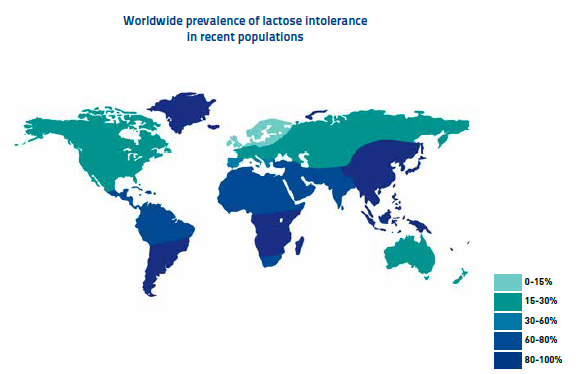Soy and lactose intolerance
Lactose intolerance means that the body is unable to – or has difficulty in – digesting lactose or ‘milk sugar’, which is found in cow’s milk, as well as in many other dairy products.
Unlike a food allergy, lactose intolerance does not involve the immune system. Lactose intolerance results from a shortage of the enzyme lactase, which is normally produced by the cells that line the small intestine. Lactase breaks down lactose into glucose and galactose that can then be absorbed into the blood stream.
In cases of lactose intolerance, the body produces either no lactase or insufficient amounts. As a consequence, the lactose will be fermented by intestinal bacteria. This gives rise to a number of complaints such as flatulence, gastrointestinal complaints and diarrhoea.
Approximately 70% of the world’s population suffers from lactose intolerance. Its prevalence is generally very low in young children and remains low into early adulthood. The ability to tolerate certain amounts of lactose differs between individuals. While some people can still consume certain amounts of dairy products without significant problems, the easiest way is to avoid intake of lactose by switching from dairy products in the diet to naturally lactose-free products.
Soy products represent an excellent alternative for those suffering from lactose intolerance or those who wish to reduce their lactose intake, since they are naturally lactose-free. Thanks to their nutritional profile soy foods offer lactose-intolerant people suitable alternatives while providing calcium and vitamin B, since most of the soy foods are enriched with these vitamins.
Other plant-based products can also be used in the diet of lactose-intolerant people thanks to their vegetable origin.
More information can be found in the EFSA opinion.

Plant-based diets
28 June 2013
Plant-based diets are environmentally friendly Many studies demonstrate that the food we eat has an important impact on our planet and…
European cultivation
28 June 2013
The EU is looking to promote protein plant production in Europe, in order to build self-sufficiency and gradually reduce dependence on…
Soy and the use of scarce natural resources
28 June 2013
The impact of eating habits on the environment The report by the Food and Agriculture Organisation of the United Nations (FAO) entitled,…
Cardiovascular health
28 June 2013
Soy for a healthy cardiovascular system Cardiovascular disease (CVD) affects millions of people throughout Europe every year. It does not…
Nutritional composition
28 June 2013
Soy foods have an excellent nutritional composition that make them fit well in a healthy and balanced diet. Not only are soy foods a source…
ENSA’s position paper on the Packaging and Packaging Waste Regulation (PPWR) proposal
31 May 2023
ENSA welcomes the Commission’s Packaging and Packaging Waste Regulation (PPWR) proposal, which aims to revamp the EU packaging legislation…